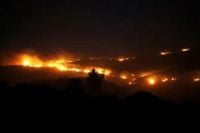As wildfires rage in Israel, Prime Minister Benjamin Netanyahu has urgently sought assistance from neighboring countries to combat the devastating blazes. The fires, which erupted in the Jerusalem mountains, have led to the evacuation of several towns as firefighting teams struggle to contain the flames.
On April 23, 2025, Israeli police began evacuating towns located approximately 20 kilometers west of Jerusalem due to the rapid spread of the fires. Reports indicate that the situation escalated quickly, prompting Netanyahu to consider international support. In a directive to officials, he emphasized the importance of maintaining communication with Greece and other nations in the event that international assistance is required.
Channel 12 news reported that three firefighters sustained injuries while battling the fires in the Jerusalem mountains. The Israeli government has declared a general mobilization for all firefighting personnel, underscoring the seriousness of the situation.
The police announced the evacuation of residents from towns situated between Beit Meir and Tesiun, with traffic halted in several areas to facilitate emergency operations. The police commissioner instructed forces to prepare for nightfall and to continue operations on highways and in towns using all available resources, including aerial support.
In a coordinated effort, the Israeli Fire and Rescue Authority revealed that 11 firefighting aircraft and over 100 firefighters from various regions are actively engaged in fighting the fires in the Ishtaol area, located in the Jerusalem mountains. The situation has been exacerbated by a severe heatwave affecting the region.
On the same day, units from the Israeli army joined the firefighting efforts, highlighting the scale of the emergency. The combination of high temperatures and dry conditions has created a perfect storm for wildfires, making containment efforts increasingly challenging.
The fires have raised significant concerns among local authorities and residents alike. As Netanyahu reaches out for help, the urgency of the situation reflects the broader implications of climate change and extreme weather patterns in the region.
The Israeli government is not only focused on extinguishing the fires but also on ensuring the safety of its citizens. The police have been actively involved in monitoring the situation and providing updates to the public as the crisis unfolds.
As the firefighting teams continue to battle the flames, the need for international cooperation becomes increasingly apparent. Netanyahu's request for assistance from neighboring countries is a critical step in addressing the immediate threat posed by the wildfires.
While the situation remains fluid, the commitment of Israeli authorities to protect their communities is evident. The mobilization of resources, including the military, showcases the seriousness with which the government is treating this emergency.
As of April 24, 2025, the fires continue to pose a significant challenge, and the outcome remains uncertain. The international community watches closely as Israel navigates this crisis, with hopes that collaborative efforts can help mitigate the disaster.
In summary, the wildfires in Israel have prompted a swift response from the government, with Netanyahu's request for international assistance highlighting the urgency of the situation. As firefighting teams work tirelessly to contain the flames, the safety of residents remains a top priority.
With the heatwave showing no signs of abating, the coming days will be crucial in determining the effectiveness of firefighting efforts and the potential for international support. The situation underscores the increasing frequency and intensity of wildfires globally, prompting discussions about climate resilience and preparedness for future emergencies.




